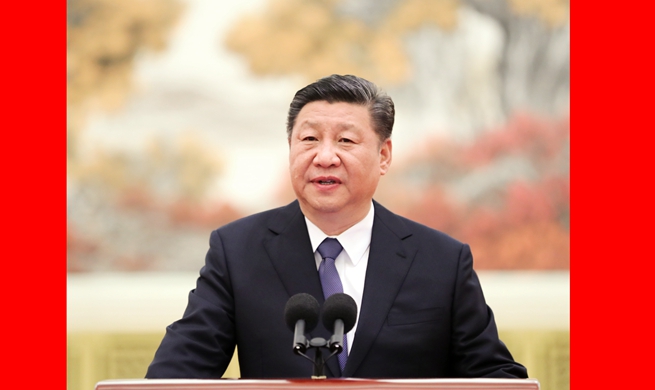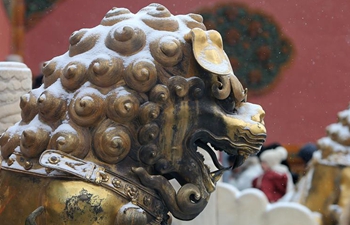by Nathan Morley
NICOSIA, Feb. 20 (Xinhua) -- As the European Union (EU) continues to seek ways to elevate the euro currency to challenge the dominance of the U.S. dollar in oil and commodities trading, two financial experts give Xinhua their evaluations of the dilemma facing Brussels.
Although the European Union is the world's largest energy importer -- spending over 300 billion euros (341 billion U.S. dollars) in the last five years -- it remains irked that it is forced to pay for the bulk of the fuel it imports in the U.S. dollar.
FACTORS BEHIND U.S. DOLLAR DOMINANCE
In an effort to tackle the problem, a wide-ranging group of industrial heavyweights -- including oil and gas executives -- met last week in Brussels to discuss how to increase Europe's economic autonomy.
The meeting came on the heels of an EU plan to circumnavigate U.S. sanctions and facilitate trade between Iran and Europe. The plan highlighted the power of the U.S. dollar in international trade.
But any attempt to dislodge the U.S. dollar as the kingpin of energy trading seems futile.
Marco Giuli, a policy analyst at the European Policy Center, says that, as it stands, the eurozone doesn't provide to the system a risk-free, liquid asset like the U.S. treasury bills, which strongly support the U.S. dollar in the international trade arena.
"Even worse, the eurozone's existence itself is at times questioned on occasion of national election processes," Giuli tells Xinhua in an interview.
"Yet," he adds, "there are structural factors in the eurozone's institutional architecture that prevent the euro from achieving a higher international stand, and there seems to be not enough political will in the eurozone to confront these weaknesses."
Another important factor is that more than one-third of the world's gross domestic product comes from countries that peg their currencies to the U.S. dollar.
"That includes seven countries that have adopted the U.S. dollar as their own. Another 89 countries keep their currency in a tight trading range relative to the dollar. They want to use the currency of their biggest trading partner so they don't suffer from exchange rate risk," Kimberly Amadeo, a U.S. economy expert for The Balance.com, tells Xinhua.
"As of the third quarter of 2018, the dollar makes up nearly 62 percent of all known central bank foreign exchange reserves. The euro only makes up 21 percent. So, even though the euro is second, it is way behind," Amadeo adds.
UNLIKELY TO CHANGE
However, as the U.S. engages in a unilateral attitude, Giuli says there could be "elements of external pressure" on European countries to consider shifts in the currency denomination of certain international commercial transactions.
By all accounts, Europe isn't alone in seeking to bolster other currencies in commodities trading as China and Russia have expressed similar goals, and debates on the issue have been amplified amid accusations that Washington is stamping its foreign policy on Europe, thus worsening a relationship already suffering the fallout from a tariff trade war.
For example, Brussels openly disagrees with the U.S. sanctions on Iran and wants to preserve the nuclear deal with or without U.S. participation. And yet, Washington has reinstated stringent sanctions, accusing Tehran of continuing to pursue nuclear weapons -- a charge Iran denies.
"It is quite telling that the EU seems to prefer ad hoc measures to counter the effects of the U.S. sanctions -- such as the establishment of special purpose vehicles for certain payments -- to strengthening the eurozone to make a case for all actors to increase the use of the euro as an international currency," Giuli says.
"Yet, the story is different when the power issuing such a global currency cedes to the temptation of taking advantage of it to engage in hostile economic statecraft. However, credible alternatives have not emerged yet. The euro is closest to be one, but it still suffers from an incomplete institutional architecture."
Furthermore, Giuli points to another equally important factor: several EU member states may have different preferences regarding the extent they'd like to challenge the U.S. dollar denomination of certain transactions.
Giuli believes there are strong elements of path dependency for the euro. "But of course," he adds, "adopting a single international currency universally accepted for global transactions does significantly reduce transaction costs for businesses."
Amadeo adds that level of trade is not the only reason the U.S. dollar is the world's reserve currency: "The strength of the U.S. economy instills trust. Most important are the transparency of U.S. financial markets and the stability of its monetary policy. The eurozone crisis a few years ago threatened the viability of the eurozone itself. That inhibits trust in using the euro as a global currency".
To further complicate matters, officials at the European Central Bank contend that boosting the euro's standing on commodities markets would require more banking and financial reforms across European Union states -- a move that seems unlikely.













